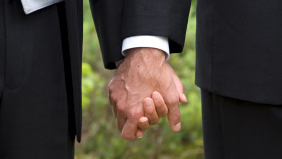Pray the Gay Away: Religion and the Same Sex Marriage Debate

I’ve always been curious why the US and my country, Canada, are so similar in some ways yet so fundamentally different in others. Case in point: 68% of Americans disagree with the statement “homosexuals should be allowed to marry.” In Canada, just 32% of people disagree with that statement, and we have national legislation that permits same sex marriage (SSM).
I’ve long suspected that the big difference in this particular view (and perhaps others) is the level of religiosity in the US compared to Canada. But there is new research that indicates that it is not religion alone that drives the American aversion to SSM. While it is true that Americans are more religious—55% report that religion is very important to them compared to 28% in Canada—opposition to SSM is highly correlated with both religiosity AND a belief that homosexuality is a choice.*
Using a US nationally representative data sample that contains information on a variety of personal characteristics, including religious views, this paper calculates the odds that an individual a) believes that homosexuality is a choice and b) objects to same sex marriages.
Firstly, the study determined that belief that homosexuality is not biologically determined is strongly correlated with religiosity. For example, those who take a literal view of the Bible are 25% more likely to believe that being homosexual is a choice. Those who believe in an angry god who is actively involved in their lives are also more likely to share this belief. Denomination matters too. For example, mainline Protestants and Catholics are far less likely to believe that homosexuality is a choice than evangelical Protestants. Other characteristics like being female, better educated, politically liberal and having no religious affiliation (hum, sounds like someone I know!) significantly increases the odds that a person will believe that homosexuality is biologically determined.
At the same time, people who believe that homosexuality is a choice are 67% less likely to support homosexual marriage. Even after controlling for this belief, those who believe that the Bible is the literal word of God are 50% less likely to support SSM, and those who regularly attend church 12%. So the belief in the determinant of homosexuality matters when it comes to whether or not an individual agrees or disagrees with same sex marriage, but even once you control for that belief religiosity still matters. Also among those who believe homosexuality is a choice, variations among denominations disappears completely—except for those who adhere to no religion at all and are more likely to support it.
This all may seem obvious, but there is an important lesson here for those who argue that better research and education are the solution to advancing same sex marriage in the US. Cognitive dissonance is the phenomenon that explains why people, even in light of new information, don’t like to update their previously-held beliefs; this research presents evidence that religion has co-opted people’s views on the science behind sexual orientation, and changing their minds could prove more difficult than thought. American same sex marriage advocates may indeed have a battle ahead of them.
* Whitehead, Andrew (2010). “Sacred Rites and Civil Rights: Religion’s Effect on Attitudes Towards Same-Sex Unions and the Perceived Cause of Homosexuality.” Social Science Quarterly Vol. 91(1).





